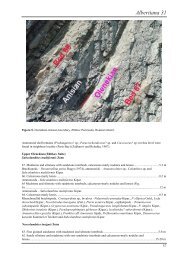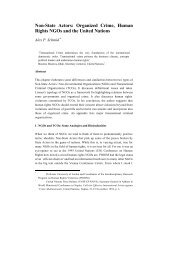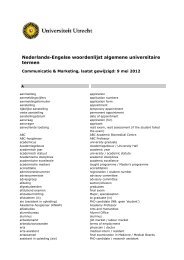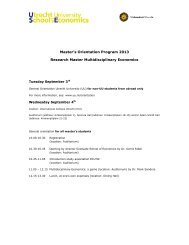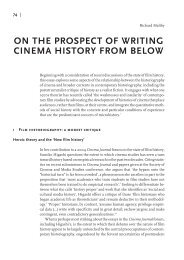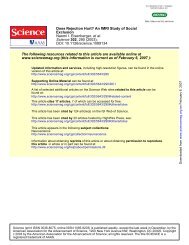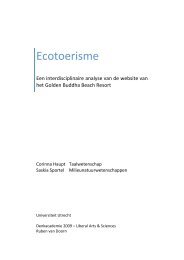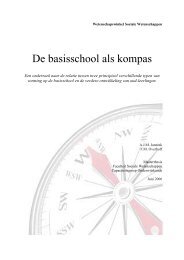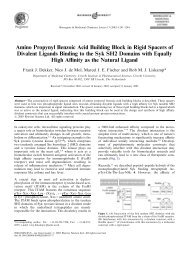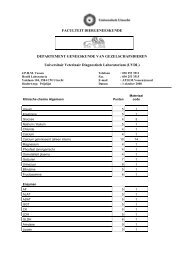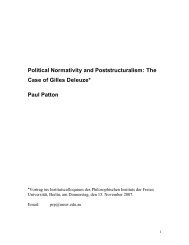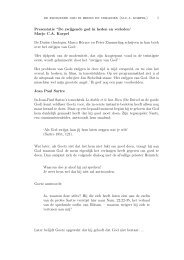Review of the Research Institute for History and - Universiteit Utrecht
Review of the Research Institute for History and - Universiteit Utrecht
Review of the Research Institute for History and - Universiteit Utrecht
You also want an ePaper? Increase the reach of your titles
YUMPU automatically turns print PDFs into web optimized ePapers that Google loves.
B 9. Internal evaluation <strong>and</strong> analysis, perspectives <strong>and</strong> expectations <strong>for</strong> research<br />
Strengths<br />
OGC is a large <strong>and</strong> wide-ranging research organization, covering a broad spectrum <strong>of</strong> <strong>the</strong> arts <strong>and</strong> humanities.<br />
The institute aims to be effi cient <strong>and</strong> supportive <strong>of</strong> <strong>the</strong> research ef<strong>for</strong>ts <strong>of</strong> its faculty. <strong>Research</strong>ers generally<br />
indicate satisfaction with <strong>the</strong> current level <strong>of</strong> assistance: <strong>the</strong> institute is indeed perceived as effi cient <strong>and</strong><br />
supportive. <strong>Research</strong> groups can pr<strong>of</strong>i t from <strong>the</strong> facilities provided by OGC, but are at <strong>the</strong> same time autonomous<br />
in setting <strong>the</strong>ir own research agendas. The programmes are well-integrated in <strong>the</strong> various national<br />
research schools <strong>and</strong> can thus pr<strong>of</strong>i t from intensive collaboration with scholars across <strong>the</strong> Ne<strong>the</strong>rl<strong>and</strong>s <strong>and</strong><br />
beyond. The current OGC structure creates a clear <strong>and</strong> workable confi guration. Thanks to <strong>the</strong>ir solid local<br />
organization, OGC researchers are prominent contributors to national <strong>and</strong> international research networks.<br />
OGC values <strong>the</strong> international pr<strong>of</strong>i le <strong>of</strong> its faculty, <strong>and</strong> promotes international mobility <strong>and</strong> exchange. OGC<br />
creates a secure environment <strong>for</strong> its PhD-students. The PhD-international programme has a success rate <strong>of</strong><br />
100%. OGC scholars manage to attract substantial <strong>and</strong> increasing external funding <strong>for</strong> <strong>the</strong>ir research, both<br />
from governmental <strong>and</strong> non-governmental sources. Commissioned research is also substantial <strong>and</strong> <strong>of</strong> an<br />
international st<strong>and</strong>ard.<br />
Weaknesses<br />
Scientifi c output has fallen during <strong>the</strong> period under review, in absolute as well as relative terms, as will be<br />
discussed (<strong>and</strong> analysed) at greater length in chapter B10. This has required new <strong>and</strong> unprecedented measures<br />
to turn around <strong>the</strong> unwelcome trend. As <strong>the</strong>se measures will only take full effect in 2006, it is too early to tell<br />
what <strong>the</strong> results will be.<br />
In <strong>the</strong> meantime, it is obvious that some OGC programmes are <strong>and</strong> operate more coherently than<br />
o<strong>the</strong>rs. Creating a stimulating research environment has proved relatively more diffi cult <strong>for</strong> large programmes<br />
<strong>and</strong> in areas where large numbers <strong>of</strong> students are taught. None<strong>the</strong>less, large programmes will be able to<br />
operate more coherently by organizing more common activities, such as regular seminar meetings, <strong>and</strong> OGC<br />
management actively encourages this.<br />
The division into programmes sometimes creates undesired barriers. This was especially true in <strong>the</strong> area<br />
<strong>of</strong> Cultural <strong>History</strong>, <strong>and</strong> <strong>for</strong> that reason we have decided to subdivide this into three distinct groups. The<br />
potential <strong>for</strong> interdisciplinary research had been under-exploited. OGC <strong>the</strong>re<strong>for</strong>e initiated <strong>the</strong> Scenarios <strong>for</strong><br />
<strong>the</strong> Humanities research programme with a specifi cally interdisciplinary content in 1999. This programme<br />
showed that a structural collaboration between various disciplines requires much time <strong>and</strong> ef<strong>for</strong>t. This is<br />
important to keep in mind when drawing up plans <strong>for</strong> similar collaborative ef<strong>for</strong>ts across <strong>the</strong> traditional<br />
Faculties in <strong>the</strong> newly <strong>for</strong>med Faculty <strong>of</strong> Arts <strong>and</strong> <strong>the</strong> Humanities. We are now considering <strong>the</strong> creation <strong>of</strong> a<br />
more permanent Humanities <strong>Research</strong> Center to especially address this issue.<br />
Although its success rate with PhD students is higher than <strong>the</strong> national average, OGC has failed to really<br />
tackle <strong>the</strong> problem <strong>of</strong> high drop-out rates, <strong>and</strong> slow progress among many <strong>of</strong> its PhD-projects. We are reconsidering<br />
our monitoring procedures <strong>of</strong> PhD-projects, <strong>and</strong> also expect that <strong>the</strong> creation <strong>of</strong> a Graduate School<br />
Arts & Humanities will help create structures that can address this issue.<br />
Opportunities<br />
The creation <strong>of</strong> a Faculty <strong>of</strong> Arts <strong>and</strong> <strong>the</strong> Humanities in 2004 <strong>for</strong>ms a new incentive <strong>for</strong> interdisciplinary<br />
work. Collaboration between OGC scholars in Ancient <strong>History</strong> <strong>and</strong> <strong>the</strong>ir colleagues in Theology <strong>and</strong> Philosophy<br />
provides an example to be followed by those in o<strong>the</strong>r areas.<br />
The new Graduate School should create a clearer division <strong>of</strong> responsibilities when it comes to <strong>the</strong> supervision<br />
<strong>of</strong> PhD-students. The number <strong>of</strong> international PhDs can be exp<strong>and</strong>ed through <strong>the</strong> Graduate School. A<br />
change in <strong>the</strong> status <strong>of</strong> Dutch PhDs, from employee to student, should open more opportunities <strong>for</strong> talented<br />
students to progress to PhD-level.<br />
The availability <strong>of</strong> a full-time research quarter (see B10) <strong>for</strong> all tenured faculty will provide all OGC<br />
scholars with a concentrated period <strong>of</strong> research time each year.<br />
OGC <strong>Research</strong> <strong>Institute</strong> <strong>for</strong> <strong>History</strong> <strong>and</strong> Culture<br />
378





